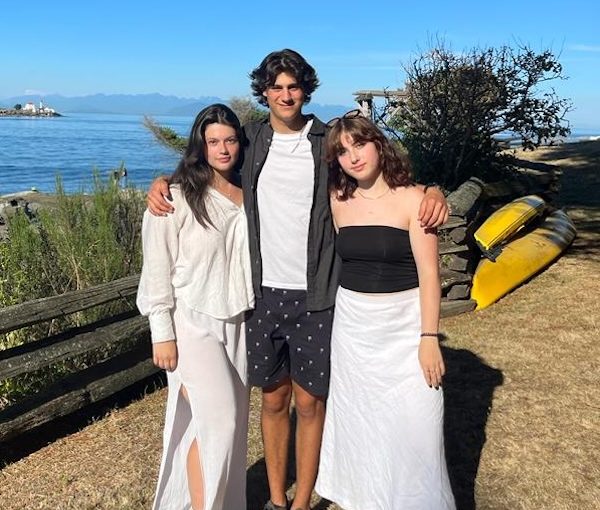Mairav Robens-Paradise, right, has found her community, and so much more, at Camp Miriam. Her closest, deepest relationships are the friendships she has made through camp. (photo from Camp Miriam)
Last summer was my 11th year at Camp Miriam. Even before my first year, in 2012, I dreamed about sneaking onto the school bus parked in the Jewish Community Centre of Greater Vancouver parking lot as we dropped off my older brothers to go to what I understood to be the most magical place on earth. Over a decade later, I can confidently say that description is an understatement.
I grew up attending public school, where my siblings and I made up the majority of the Jewish population. I don’t recall my immense excitement to go to camp being consciously related to my Judaism, but unbeknownst to 8-year-old me, it would forever alter my connection to my sense of self and my community. Camp Miriam fostered the environment that allowed me to grow into my Jewish identity. At camp, you are surrounded with people who all relate to their Judaism in different ways, both culturally and religiously, and are given the tools and safety to form that unique, personal relationship.
I am currently in my second year of university at McGill, in Montreal, living with two friends from camp. It has been incredibly important to me to have a Jewish community nearby, especially over the past several months, and my roommates are just a fraction of the connections Camp Miriam has given me.
The strength of the friendships I have made over my years of involvement with the camp overpowers any other facet of my life. The values we learn, the skills we practise and the tools we gain at camp equip us to manage complex interpersonal relationships, resolve conflicts and gain independence. Whether it’s learning how to tie knots for camping, defusing relational tensions or discussing social justice, chanichimot (campers) and madrichimot (counselors) alike do so in a secure and empowering environment. Now, as a student who lives away from home, Camp Miriam and its extensive community keep me tethered and grounded to my Judaism and my personal values.
Camp Miriam’s unique structure as a youth-led camp provides empowerment to its entire community. Over the last two years working as a madricha (counselor), I have been trusted with a multitude of responsibilities. Last summer, I had a tafkid (role) that consisted of organizing the programming that occurs during Shabbat. Some of our traditions every Friday include everyone dressing in their nicest clothes and competing for the cleanest cabin award. These small but significant means of welcoming in Shabbat in fun ways foster an exploratory environment for kids to form their connections to Judaism at their own pace.
As a kid, my favourite part of Shabbat was rikud (dance), when all of camp gathers for Israeli dancing. Now, as a madricha, my favourite part is Havdalah, which is a ceremony held every Saturday night to signify the end of Shabbat. Last summer, we introduced live music to our Havdalah tradition, which we listen to while everyone is gathered in a circle watching the ceremonial candle burn. These shared moments all contribute to creating an incredibly strong community of Jewish youth.
As I’m writing this article, I’m sitting in the living room of a member of my national kvutzah (age group/cohort), surrounded by the company of 18 other Jewish members of Habonim Dror North America, the larger movement that Camp Miriam is a part of. This experience really encapsulates what Camp Miriam has given me as a Jew. The closest, deepest relationships I have are the friendships I have made through camp. It’s just not about making friends, learning and forming your identity, but also about finding your community. As I look around, I come to realize – I owe a lot to Camp Miriam.
Mairav Robens-Paradise is a second-year student at McGill University in Montreal. Last summer was her 11th year at Camp Miriam.

